Philosopher and theologian R. C. Sproul speaks of Edgar Allan Poe’s despair in his poem The Raven. (Surprised by Suffering by R.C. Sproul PLAYLIST)
Systematic Theology


Pastor Robert Jeffress Defends Biblical View of Marriage
Christian pastor Robert Jeffress (from First Baptist Dallas) systematically destroys gay reverend Neil Cazares-Thomas’ (from the Cathedral of Hope) arguments point-by-point on same-sex marriage.
Related:
- Science Shows Gay People Can Change Their Sexual Orientation (Must See!)
- Celibate Gay Christian Says Marriage Should Be Between One Man and One Woman
- Slavery in the Bible?
- Is God a Moral Monster? | Does God Condone Slavery? (Session 1 Q&A)
- FAQs About Christian Bakers Aaron and Melissa Klein
- The Bible and Homosexuality
- Christianity and Homosexuality
- Ex-Gay people who converted
- Same-Sex Marriage: How Should Christians React
- Children of Gay Couples Oppose Same-Sex Marriage
- Black Preacher [Voddie Baucham] Says Gay Is Not The New Black
- Proof Religious Freedom at Risk Because of Same-Sex Marriage
- Court Forces Christian to Violate Religious Freedom!
- Correct, Not Politically Correct: How Gay Marriage Hurts Everyone
- Is God Anti-Gay?

Eye for an Eye: One of the Greatest Ideas in History
Nowadays, many people, particularly those living in Western civilization, no longer regard their society as morally superior to any other. In this video, Dennis Prager lays out how this view does not spring from intellectual rigor, but from intellectual laziness.
SEE ALSO: Dennis Prager deals with the misconceptions related to skeptics charge against Deuteronomy 21:18-21. Many of these Torah verses are ripped from their historical and hermeneutic context (CARM Deuteronomy)
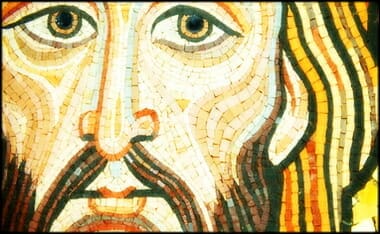
Is Penal Substitution Biblical?
This viewpoint has come under attack as of late. Here is a good “definition” from CARM:
- Penal Substitution is a theological viewpoint within Christianity that maintains Jesus was legally punished in place of the sinners. That is, He took the place of the sinner. It is “penal” in that Christ suffered the penalty of the Law, taking the “penalty” of the Law. It was substitutionary in that Christ took our place on the cross when He bore our sins (1 Pet. 2:24) and became sin on our behalf (2 Cor. 5:21)….. Though there are varying views of the atonement, the Vicarious Substitutionary Atonement (Penal Substutionary Atonement) best explains the Scripture and most importantly, it probably relates the satisfaction of Law as a relates to the holiness of God.
The GOSPEL COALITION (AU) notes the importance of this view as The Heart of the Gospel

Light-n-Salt In A World of Politics
Just wanted to share this comment on Scripture from a 1987 book I am reading. Front and back cover follow the quote, click to enlarge.
2. Light and Salt
Ye are the salt of the earth: but if the salt have lost his savour, wherewith shall it be salted? it is thenceforth good for nothing, but to be cast out, and to be trodden under foot of men. Ye are the light of the world. A city that is set on an hill cannot be hid. Neither do men light a candle, and put it under a bushel, but on a candlestick; and it giveth light unto all that are in the house. Let your light so shine before men, that they may see your good works, and glorify your Father which is in heaven.
MATTHEW 5:13-16, KJV
Christ reminded the disciples of their twofold obligation: they were to be salt and light. The illustration of salt implies both the concept of a covenant people and a moral conscience in the culture at large. In the Old Testament salt was symbolic of a covenant (Num. 18:19). in ancient Greek and Arab societies, legal agreements were confirmed by eating bread dipped in salt. Jesus is suggesting that we who are his disciples are the salt of the earth—we are his covenant people. Salt was also utilized in ancient cultures for preserving and flavoring meat. Jesus seems to be implying that we are also a moral preservative and ethical conscience to ‘the society in which we live. As representatives of his righteous standards, we should be involved in preserving Judeo-Christian values as foundational for the health of the society in which we live.
Jesus also refers to us as the light of the world. Most commentators interpret this to mean that we have an evangelistic obligation to society. We are to shed the light of the gospel on the dark world around us. While this is certainly true, Jesus is also speaking of the light of our “good deeds” (v. 16). We are to be a moral conscience (salt), but at the same time we are to demonstrate that moral standard through our good deeds (light). In other words, we have no right to call for justice unless we are ourselves just in dealing with others….
- Richard John Neuhaus, Gen. Ed., The Bible, Politics, and Democracy (Grand Rapids, MI: William J. Eerdmans Publishing, 1987), 10-11; from chpt 1, “The Bible, Politics, and Democracy,” by Edward Dobson.
 |
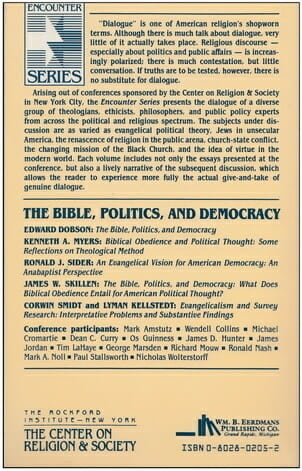 |

The High Calling Of Parenting
In this third part of the summer “Family Series,” Pastor Jackson touches on where the parent/child relationship excels and fails Biblically, giving handy Scriptural reminders and useful tools to inculcate these “weighty measures” place on children and especially parents.
1) Biblical Roles in the Family
2) Worshipfully Prioritize Your Marriage by Faith!
3) The High Calling Of Parenting
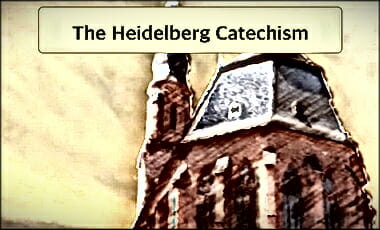
Zacharias Ursinus | Caspar Olevianus (Heidelberg Catechism)
Zacharias Ursinus (1534-1583), a sixteenth century German theologian, born Zacharias Baer in Breslau (now Wroc?aw, Poland). Like all young scholars of that era he gave himself a Latin name from ursus, meaning bear. He is best known as a professor of theology at the University of Heidelberg and co-author with Caspar Olevianus (1536-1587) of the Heidelberg Catechism…. (THEOPEDIA)
The Heidelberg Catechism is a document used in Reformed churches to help teach church doctrine. It takes the form of a series of questions and answers to help the reader better understand the material. It has been translated into many languages and is regarded as the most influential Reformed catechism.
Elector Frederick III, sovereign of the Palatinate from 1559 to 1576, appointed Zacharias Ursinus and Caspar Olevianus, to write a Reformed catechism based on input from the leading Reformed scholars of the time. One of its aims was to counteract the teachings of the Roman Catholic Church regarding theology, basing each statement on the text of the Bible…… (THEOPEDIA)

To Raise Your Hands In Church, Or Not
This comes by way of MOD-BLOG and imported from my old BLOGSPOT blog (December 07, 2009). After a discussion about the act of raising one’s hand’s I was preparing to blog on it… however, after reading Nomads post I am merely going to tout this post as something I cannot top or I would at the most equal. So if it has already been done, why not give props where props are due. Plus, I may be a bit lazy right now.
I come from a conservative background of the Protestant church tradition. My friends and family tend to be non-demonstrative lot at church, with little more than the occasional “A-men!” when we are REALLY moved. So, it has bothered me to see a particular phenomenon from the charismatic/pentecostal tradition starting to appear in church – the raising of hands. This action, usually done during singing, always seemed showy to me and distracting. But, it is important to separate “it bothers me” from “it is wrong.” So, I decided to do some research into the phenomenon, and see what the Bible had to say.
First, I found an amazing number of defenses of the practice online. The best explanation of why people lift their hands in worship came from HERE.
- Lifting the hands is a symbol of surrender.
- Lifting the hands is a symbol of trust.
- Lifting the hands is a symbol of openness.
- Lifting the hands is a symbol of affection.
The “surrender” symbolism is especially significant, it seems to me. In my own observation, I have noticed that the lifting of hands is especially common among women in the churches I have visited. Surrender is something that is culturally-appropriate for women in America – giving oneself to your husband, to your children, to your church, to your friends – but is less culturally-appropriate to the rugged individualism which governs men in our culture.
In looking through scripture, there appears to be three classifications for the raising of hands:
- Prayer (5 references): 1 Timothey 2:8, Lamentations 3:40-42, Psalm 28:1-2, Psalm 141:1-2, Nehemiah 8:5-6;
- Worship (2 references): Psalms 63:3-4, Psalm 134:1-3;
- Study (1 reference): Psalm 119:48.
Going by the pure number of references, it is clear scripture favors the raising of hands as a posture of PRAYER over worship. However, it is equally clear that scripture does call for the lifting of hands in worship. One interesting note from the same article listed above may be significant in this.
The Hebrew word for hand is the word yad; yadah means to “throw out the hand” or to worship with extended hands.
Which may indicate that the extension of hands to an object of adoration is simply an assumption of Hebrew culture.
Another article noted one other aspect of the raising of hands – which C.S. Lewis also applies to kneeling in The Screwtape Letters – is that movements and positions of the body influence the attitude of the mind and heart.
[Another] article which makes the claim that all raising-of-hands references in the old testament are related to the sacrificial system, and thus are inappropriate to a Christian world where sacrifices have been fulfilled by the death and resurrection of Christ. The author dismisses the 1 Timothy 2:8 scripture as a figurative passage asking for “clean hands” of Christians.
Overall, the middle road here appears to be that the raising of hands is a Biblical practice. It is permitted and encouraged by Scripture, but is not commanded or required. This article does a good job of summarizing what I have come to: worshiping with lifted hands is appropriate and scriptural, but should be done with an eye toward its potential impact on others around you. If you are in a service with people who will find it distracting, or who will be tempted toward showing off, then keep your hands down. If you are in a service where people are comfortable or ambivalent to the practice, go right ahead.
For me, this study has been a comfort. It reminds me that my own prejudices should not rule how I view others, or their relationship with God. Surely, some raise their hands to be showy. But others do so with sincere hearts, looking to praise God and obey scripture.
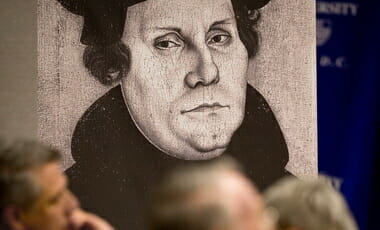
The Insanity of Luther (R. C. Sproul)
R. C. Sproul’s popular lecture on Protestant Reformer Martin Luther.

Tattoos and the Bible
Leviticus 19:28 states: “You shall not make any cuts in your body for the dead, nor make any tattoo marks on yourselves…” (NASB). Is this a forbiddance of getting a tattoo? Or was this written for a specific people, in a specific time, with a specific example in mind (God’s mind). Lets see what some commentators have to say on what this example would be that caused God to forbid marking or engraving on one’s body.
Matthew Henry’s Commentary: v. 28“They shall make cuts or prints in their flesh for the dead; for the heathen did so to pacify the infernal deities…”
New Bible Commentary: vv. 29-31 “The main focus of this section is to exclude rites and practices associated with pagan, Canaanite religion, particularly those which were physically or morally disfiguring. Abuse of the body in the name of religion is a wide spread human aberration…”
The International Bible Commentary: v. 28 “Cutting the flesh was a feature of the worship of Melqart (Baal in Old Testament)…. There are various explanations of this self-disfigurement which have been advanced: to provide blood for a departed spirit, to render mourners unrecognizable to departed spirits, to drive away the spirits by the life-force resident in the blood, and so on…”
The point here is that if one were to interpret this in a wooden literal sense that applies to today’s tattooing of the body for non-religious purposes, then one would apply verse 27 to getting “bowl-cuts.” For we read: “You shall not round off the side-growth of your heads, nor harm the edges of your beard” (NASB).
Matthew Henry Commentary: “Those that worshipped the hosts of heaven, in honor of them, cut their hair so that their heads might resemble the celestial globe; but, as the custom was foolish in itself, so being done with respect to their false gods, it was idolatrous.”
Yes, Matthew Henry just called the bowl-cut “foolish,” but when done for religious purposes, it is wrong. As with the tattoo, if done for spiritual purposes, it is forbidden. If done for personal reasons, I see no harm. If I am wrong, I suspect that when one receives their glorified body, it will be washed clean with the blood of Christ. Because only then will we be perfect, the creation God originally intended.
I see no clear precedence in the Bible for not getting a tattoo if done for non-religious purposes. If one were to interpret this as following the law, a maelstrom would soon follow; not to mention the book of Galatians being thrown out the window.
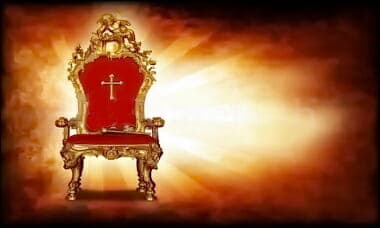
All Creation WILL Praise God (Psalm 145:10)
I have been reading over PSALM 145 a few times… meditating on the Song calling us to action, to praise of our Lord, and the like. Verse 10 stood out a bit to me, I will explain. But first, here are a few different versions of the same verse:
All your works shall give thanks to you, O Lord,
and all your saints shall bless you! (ESV)
All You have made will thank You, Lord;
the godly will praise You. (HCSB)
All Your works shall give thanks to You, O Lord,
And Your godly ones shall bless You. (NASB)
All creation will thank you,
and your loyal people
will praise you. (CEV)
All Your works shall praise You, O Lord,
and Your godly ones shall bless You. (MEV)
I noticed a split here… almost a change in “who” was being spoken of here. The first section included ALL of creation… everything in it. The second section of that verse seem to delineate a separated people. In supporting the idea that this first part is speaking to every being within creation (even creation “itself”) is again noted at the very end of the Psalms:
- Let everything that breathes praise the Lord. Hallelujah! (CSB)
Everything that breathes are not regenerated. This includes, in my thinking, even the unregenerate — since the breath. I started to think of verses such as Revelation 5:13; Isaiah 45:23-24; Philippians 2:10-11, and the like. Of course we are all familiar with this Philippians verse:
- “so that at the name of Jesus EVERY KNEE WILL BOW, of those who are in heaven and on earth and under the earth, and that every tongue will confess that Jesus Christ is Lord, to the glory of God the Father” (NASB).
Here is some in-depth commentary on this verse:
Ultimately, every creature in the universe will acknowledge who Jesus is. Two concerns must be discussed: the meaning of “at the name of Jesus” and the description of which persons acknowledge him. The phrase “at the name of Jesus” may mean that he is the object of worship, that he is the medium of worship,165 or that he provides the occasion and focus of worship. The context clearly reveals that Jesus is to be the object of worship, as the name “Lord” and his exalted position indicate. That rules out Jesus as a medium of worship, but more may be required by this expression. In fact, more is intended. Wherever Jesus’ name (and character) has authority, he will be worshiped. Since he is authoritative everywhere, as the next phrase indicates, he will be worshiped everywhere. The emphasis of this text, however, is not directly on the worship of Jesus. The language is that of triumph. The bending of the knee was a posture of submission, as was confessing “Jesus Christ is Lord.” The hymn, therefore, speaks to Jesus as the conqueror of all and should be seen as parallel to such texts as 1 Cor 15:24–28. Thus the hymn points out that everyone will acknowledge the position of Jesus in the universe.
The second concern of this first purpose clause is the persons who submit to Jesus’ lordship. The text states, “in heaven and on earth and under the earth.” The meaning of the text is that it is the knees of beings located in these places. Paul could and did use personification to speak of the relation of inanimate objects to Christ (Rom 8:19–22), but this context is confined to persons. Jesus’ lordship encompasses spiritual beings (those of “heaven”—good or evil), living human beings (those of “earth”), and dead persons as well (“under the earth”). Thus the hymn includes every conceivable habitation of personal beings.
The second purpose statement is that “every tongue will confess that Jesus Christ is Lord.” In a parallelism typical of poetry, both the universal nature of Jesus’ lordship and the acknowledgment of it are reemphasized. “Every tongue” includes the same beings as “every knee” which bows. The confession “Jesus Christ is Lord” encapsulates this aspect of the Christian faith and may well have been the earliest Christian confession.
Honoring Jesus in this way fulfills God’s plan. He elevated Jesus to the position of lordship (v. 9), and the confession is “to the glory of God the Father.” There is perfect unity in the Godhead. The actions of Jesus in his exaltation bring glory to the Father. Thus the Father honors the Son, and the Son honors the Father. In this dynamic, both display selflessness, and both receive honor.
This is an eschatological picture. The hymn brings the future into view by describing the culmination of history, when all persons will acknowledge Jesus’ lordship. No evidence states that such acknowledgment will bring salvation, however. That must be cared for in the present, before Jesus conquers his enemies. The church bears witness to Jesus’ lordship by confessing to the world “Jesus Christ is Lord” and offering salvation to those who accept that confession and make it the central part of their lives (Rom 10:9–10). Paul recognized, therefore, that some people will voluntarily accept the reality that Jesus is Lord and participate in his reign of glory. Others will deny that lordship and, in the end, be conquered by the Lord himself. For them, it will be too late to participate in the glory, and they will be destined to the punishment appropriate for those who resist the Lord.
Richard R. Melick, Philippians, Colossians, Philemon, vol. 32, The New American Commentary (Nashville: Broadman & Holman Publishers, 1991), 107–108.
Likewise, I was drawn to REVELATION 5:13 as connected to this Psalms and it’s future ruminations:
Then I heard every creature which is in heaven and on the earth and under the earth and in the sea, and all that are in them, saying:
“To Him who sits on the throne and to the Lamb
be blessing and honor and glory and power,
forever and ever!”
This verse drips with this distinction I noted in Psalm 145:10. Here are a [more than] few commentaries on Revelation 5:13 —
This movement is extraordinary. Joining the host of heaven apparently are all the beings created by God, including not just humans but other forms of life as well. Conceivably, this chorus of glory to the Lamb even includes those who are perishing, since, after all, Paul has promised that “every knee should bow … and every tongue confess that Jesus Christ is Lord, to the glory of God the Father” (Phil 2:10–11). Redemption has no specific mention in this final chorus, simply the worthiness of the Lamb to receive praise, honor, glory, and power, and his worthiness to receive this forever.
Paige Patterson, Revelation, ed. E. Ray Clendenen, vol. 39, The New American Commentary (Nashville, TN: B&H, 2012), 175.
Animals, birds and fish join with humanity in a great act of divine worship. Even the underworld, the abode of the dead and dwelling-place of evil, is involved. Clearly this vision does not reflect present reality from John’s perspective, for rebellion and injustice still exist in God’s world. Rather we catch a glimpse here of what creation was intended for, and what can be in God’s great plan, on earth, as it is in heaven.
Ian Boxall, The Revelation of Saint John, Black’s New Testament Commentary (London: Continuum, 2006), 102.
On that day every creature including the unsaved (cf. Phil 2:9–11)—will give the Father and the Son the glory they deserve.
Robert Vacendak, “The Revelation of Jesus Christ,” in The Grace New Testament Commentary, ed. Robert N. Wilkin (Denton, TX: Grace Evangelical Society, 2010), 1275.
Loud sevenfold praise for the Lamb spills over from the heavenly throne room and is joined by every creature … on the earth … under the earth … in the sea, as is seen in Pss. 148 and 150. Blessing and honor and glory and power: From the vantage point of heaven, these verses look forward to the climactic point when “every tongue should confess that Jesus Christ is Lord” (Phil. 2:11).
Earl D. Radmacher, Ronald Barclay Allen, and H. Wayne House, Nelson’s New Illustrated Bible Commentary (Nashville: T. Nelson Publishers, 1999), 1743.
The entire created order now joins in the mighty chorus—everything in heaven, on earth, under the earth, and in the sea—in adoration of both God and the Lamb together (5:13)
Walter A. Elwell, “Revelation,” in Evangelical Commentary on the Bible, vol. 3, Baker Reference Library (Grand Rapids, MI: Baker Book House, 1995), 1209.
Now the music becomes a diapason, a full, deep burst of harmonious song. Every creature … in heaven and on the earth joins in heaping eternal blessing and honor and glory and power on God the Father and on the Lamb.
This verse parallels Philippians 2:10 and 11, which insists that every knee will bow at the name of Jesus and every tongue confess Him Lord. No single, specific time is mentioned, but it will obviously be after the saved are raised to everlasting life and then after the unsaved are raised to everlasting judgment. Believers will have already acknowledged Jesus as Lord; unbelievers will then be compelled to honor Him. Universal homage to the Father and the Son is an assured fact.
William MacDonald, Believer’s Bible Commentary: Old and New Testaments, ed. Arthur Farstad (Nashville: Thomas Nelson, 1995), 2363.
The universality of Christ’s work calls for this universal praise.
Robert B. Hughes and J. Carl Laney, Tyndale Concise Bible Commentary, The Tyndale Reference Library (Wheaton, IL: Tyndale House Publishers, 2001), 741.
All animated creation now joins in the ascription of praise. Those under the earth are probably the “spirits in prison” of 1 Pet. 3:19, though Vitringa understands the expression to be used of the devils “who unwillingly obey Christ,” and even declare his glory, as in Mark 1:24, “I know thee who then art, the Holy One of God.” The sea is meant literally; the apostle’s object being to include all animated beings wheresoever existing. It has been remarked that St. John’s exile at Patmos would render him familiar with the appearance of the sea, and account for its frequent use in the Apocalypse, both literally and symbolically. The things on the sea would signify, not merely ships with their inhabitants, but also those animals in the sea which are known to men by dwelling near the surface. “All things that are in them” serves to render emphatic the universality of the description, as in Exod. 20:11 and Ps. 146:6, “The Lord made heaven and earth, the sea, and all that in them is.”
H.D.M. Spence-Jones, ed., Revelation, The Pulpit Commentary (London; New York: Funk & Wagnalls Company, 1909), 167.
Just try to imagine such singing. This, of course, means all intelligent life in the universe. In the strictest sense, this cannot happen until the final consummation (Phil. 2:10–11). However, in many places John’s visions record events yet future, so we should not be troubled by this anticipation of the Son’s universal worship. Note also the extreme chronological sweep of the throne room worship scene developed in chapters 4 and 5:
✧ The worship of the Almighty by the living creatures and the elders has been going on since their creation eons ago.
✧ The worship of the Lamb by the heavenly court and all the angels has occurred—at least in this manner—since he was slain.
✧ The worship of both the Almighty and the Lamb by all the universe’s creatures has yet to become a reality.
Kendell H. Easley, Revelation, vol. 12, Holman New Testament Commentary (Nashville, TN: Broadman & Holman Publishers, 1998), 96.
This scene anticipates the universal acclamation to be offered at the consummation of all things. If it represents universal praise in an absolute sense, then it issues not only from God’s willing subjects but also from his opponents, who will be forced into submission (as in Phil. 2:10–11; Col. 1:20). Rev. 5:9–12 and 5:13 are good examples respectively of the “already” and “not yet” time reference of chs. 4–5 in particular and of the Apocalypse in general.
G.K. Beale, The Book of Revelation: A Commentary on the Greek Text, New International Greek Testament Commentary (Grand Rapids, MI; Carlisle, Cumbria: W.B. Eerdmans; Paternoster Press, 1999), 365.

You Do Not Know God Without Suffering

This extended quote picks up a few points into Luther’s Heidelberg Disputation, enjoy the suffering…
- Michael Reeves and Tim Chester, Why The Reformation Still Matters (Wheaton, IL: Crossway Books, 2016), 99-105.
In case one is wondering, I highly recommend this book as well as Reeves other book, The Unquenchable Flame: Discovering the Heart of the Reformation. It is the 500th year anniversary of the Reformation… for God’s sake learn about it.
21. The theologian of glory says bad is good and good is bad. The theologian of the cross calls them by their proper name.
This is really quite clear, for as long as a man does not know Christ he does not know God as hidden in sufferings. Such a man, therefore, prefers works to sufferings, and glory to a cross: he prefers powers to weakness, wisdom to foolishness…. These are they the Apostle calls enemies of the cross of Christ. Quite clearly, because they hate the cross and sufferings and certainly love works and the glory that goes with them. And thus they say that the good of the cross is evil, and call the evil of works good. But God is not to be found except in sufferings and in the cross as has been stated already…. It is impossible for a man not to be inflated by his own good works unless the experience of suffering and evil, having previously taken all the spirit out of him and broken him, has taught him that he is nothing and his works are not his own but God’s.
22. The sort of wisdom which sees the invisible things of God in known good works simply inflates a man, and renders him both blind and hard.
This has been said already. For since it is clear that they know nothing about the cross and even hate it, then of necessity they love the opposite, that is wisdom, glory, power and the like….
He who wishes to become wise should not go forward and seek wisdom but should become a fool, go back and seek foolishness. Thus, he who wants to become powerful and famous, to have a good time and enjoy all the good things of life, let him flee from power, fame, enjoyment and a sufficiency of everything and not seek after them. This is the wisdom we are talking about, the wisdom which is foolishness to the world.
The question Luther is addressing is this: How can we know God? There are some visible things humanity could look at: creation, spiritual experiences, miracles. But Luther says that they do not reveal God. Or, rather, they reveal something of God, but it is the kind of knowledge that puffs people up. As a result, people never get beyond their pride to know the real God. This knowledge could “never be enough for a man, nor could it benefit him” (20). People like this think they have knowledge, but they do not—they are fools.
Is God then unknowable? If we cannot know him through what is visible, then can we know him at all? Are we left trying to know God through what is invisible? That is not very promising, because we cannot see it! Luther’s answer is this: God is known through what is contrary. He is known in a hidden way. God’s invisible attributes are revealed in suffering and the cross: glory in shame, wisdom in folly, power in weakness, victory in defeat. God is known through the message of the cross.
So what Luther calls theologia crucis, “the theology of the cross,” is not so much an understanding of how the cross saves us (though, of course, that mattered to Luther). Even more, it is an approach to knowing God. It claims that knowing him starts with the cross. And this starting point turns all our notions of God and how he can be known upside down.
The theology of the cross stems from Luther’s understanding of righteousness and justification. Luther’s great realization was that God justified sinners. God declares to be just those who are unjust. Luther realized that if that is so, human notions of justice can never lead us to understand God’s justice. God’s justice is revealed in the opposite of justice: in the justification of the unjust. Alister McGrath says:
Luther’s discovery of the “wonderful new definition of righteousness” is essentially programmatic, and capable of being applied to other divine attributes… leading ultimately to the theologia crucis, the “theology of the cross”….
…For Luther, the “righteousness of God” is revealed exclusively in the cross, contradicting human preconceptions and expectations of the form that revelation should take.
If knowledge of God could be obtained from what is visible (creation, spiritual experiences, miracles), it would lead to pride. Imagine if we knew God through creation. The people who knew him best would be those with the brains to understand the science of the universe. Or imagine we knew God through spiritual experience. The people who knew God would be those wealthy enough to spend time in contemplation. People would be able to say, “I know God through my intelligence or my spirituality or my morality or my power.” It would lead to pride, and this pride would then obscure the glory and grace of God.
But God determined that he would be known through suffering so that he would be hidden from all those who exalt themselves. Here Luther is echoing the words of Jesus in Matthew 11:25-26: “I thank you, Father, Lord of heaven and earth, that you have hidden these things from the wise and understanding and revealed them to little children; yes, Father, for such was your gracious will.”
The opposite of the theology of the cross are theologies of glory. The theologians of glory pursue wisdom, experience, and miracles and say that suffering is bad. But the theologian of the cross values suffering as that through which God is revealed. Knowledge of God is not found through human wisdom, human powers, or human achievements. It is found in the foolishness of the cross.
The religious leaders at the cross are like theologians of glory. They think God will reveal himself in a powerful act in which Jesus comes down from the cross (Mark 15:29-32). But by faith the centurion sees God revealed in the suffering and abandonment of Jesus (Mark 15:39).
Luther talks about God’s “alien work,” opus alienum, his actions which are alien to his nature, but by which he achieves his “proper work,” opus proprium. Sometimes God assaults us in order to break us. In this light, suffering can be seen as a gracious divine gift.
Only someone who has had “all the spirit [taken] out of him and [been] broken” can know God. Often Luther is translated as saying that “humility” is the precondition for knowing God. But the word is really “humiliation.” Only someone who is humiliated before God can truly know him. In other words, Luther is not commending a certain type of piety that paves the way to a better understanding of God. He is saying that we have to come to the end of ourselves before we accept God’s gracious revelation. In another context Luther gave this advice to those who aspired to study theology:
I want you to know how to study theology in the right way. I have practiced this method myself. . . . The method of which I am speaking is the one which the holy king David teaches in Psalm 119. . . . Here you will find three rules. They are frequently proposed throughout the psalm and run thus: oratio, meditatio, tentatio [prayer, meditation, trials].
Trials are a key way in which we learn the truth about God. Luther had in mind verses like these:
Before I was afflicted I went astray,
but now I keep your word. (Ps. 119:67)
It is good for me that I was afflicted,
that I might learn your statutes. (Ps. 119:71)
I know, 0 LORD, that your rules are righteous, and that in faithfulness you have afflicted me. (Ps. 119:75)
It is often trials that move knowledge from our heads and embed it in our hearts.
Luther was skeptical about the value of philosophy in theology. “Theology is heaven, yes even the kingdom of heaven; man however is earth and his speculations are smoke.” Luther, never knowingly understated, described “reason” as the Devil’s whore, a beast and the enemy of God. In fact Luther valued reason in matters of human society. He also valued reason as a tool to order biblical material. But we cannot discover the truth about God through human reason. Quite the opposite—reason leads us astray because the God revealed in the cross is contrary to human expectations.
Instead, to recognize God in the absence of God, to recognize victory in defeat, to recognize glory in shame requires faith. God is known only by faith. And because knowing him requires faith, this is an act of grace.
So God can be known only by those to whom he gives faith. Salvation is by grace alone. We are used to that idea. But it is the same for our knowledge of God. It is not just our salvation that is by faith alone and grace alone. We do not contribute to our knowledge of God. It is all God’s doing. Our knowledge of God is by grace alone. You do not know God because you were cleverer than other people or have greater spiritual insight or spend more time in contemplation. You know God because he has graciously revealed himself to you in the message of the cross. It is an act of grace. God reveals himself in a hidden way in order to safeguard the graciousness of revelation.
So the cross subverts all human notions of glory. The message we proclaim—the message of Christ crucified—is foolishness and weakness in the sight of the world. This is Paul’s point in 1 Corinthians. Indeed, in many ways Luther’s theology of the cross often feels like an extended meditation of 1 Corinthians 1. In 1:23-25 we read:
We preach Christ crucified, a stumbling block to Jews and folly to Gentiles, but to those who are called, both Jews and Greeks, Christ the power of God and the wisdom of God. For the foolishness of God is wiser than men, and the weakness of God is stronger than men.
And with this foolish, weak message of the cross goes a foolish, weak community of the cross.
But God chose what is foolish in the world to shame the wise; God chose what is weak in the world to shame the strong; God chose what is low and despised in the world, even things that are not, to bring to nothing things that are, so that no human being might boast in the presence of God. (1:27-29)
So the cross leaves no scope for human boasting. Instead our one boast is in Christ Jesus, “who became to us wisdom from God, righteousness and sanctification and redemption.” Therefore, “Let the one who boasts, boast in the Lord” (1:30-31).
Let us summarize the key features of Luther’s theology of the cross [McGrath again]:
[…..]
5. God is particularly known through suffering. It is not just that God can be known through suffering, but that he uses suffering to make himself known. And for Luther this encompasses both the sufferings of Christ and the sufferings of the individual. God humiliates us so that we may know him.

